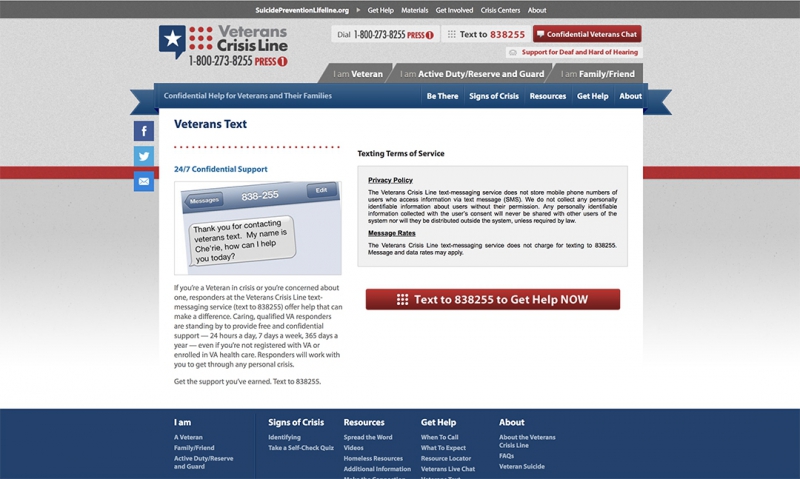
Legionnaire Izzy Abbass was instrumental in getting the text feature of VA's Veterans Crisis Line implemented and wants to continue to raise awareness for the valuable tool.
Izzy Abbass was at the Department of Veterans Affairs VISN 2 Center of Excellence for Suicide Prevention in Canandaigua, N.Y., when VA debuted the texting aspect of its Veterans Crisis Line in late 2011.
It made sense for him to be there. The Army Desert Storm veteran and member of American Legion Post 178 in Denver had been instrumental in pairing up wireless communications companies with VA to help the text system go online.
“I remember being up there, and they had a guy (text the line) who was back from Afghanistan for about 72 hours, and they were on the phone with him for three and a half hours,” Abbass said. “It turns out he was in a closet with a gun with his family in the house. I’m just thankful that he had the wherewithal to text in and get help. I was glad there was a way that people could get help.”
In May 2009 Abbass – who has worked in the wireless and telecommunications sector for more than two decades – was at a trade show when he began talking to other wireless providers about getting involved with VA’s suicide prevention efforts.
“I had no idea how the overall concept would work,” Abbass said. “But to a person, every carrier said ‘Yes, we would do this. Tell us what we need to do and we’ll support you.’”
Over the next two years Abbass worked with VA at the VISN level and then nationally – and with wireless providers – to help develop the program. Abbass was able to negotiate with all of the wireless carriers to not charge a cent for texts to and from the crisis line, as well as getting them to agree to exempt VA from having to provide an opt-out response to veterans using the line.
Abbass also talked with Jan Kemp, who served as VA’s National Mental Health Program Director for Suicide Prevention from 2007 until 2014, and other VA leadership during the process who shared with him a mobile app that was being developed along those lines. But Abbass continued to stress the need for a text feature in the Veterans Crisis Line.
“’This is an ocean liner you’ve got coming in here. What you need is a life preserver,’” Abbass said he told VA leadership. “Because if you’re spiraling out of control … you’re not going to have the wherewithal to find a hot spot, make sure you have data connection, download this mobile app … answer 17 questions and then get help. What you need is an immediate lifeline to somebody that can help you and keep you from going over the edge.”
Abbass was successful in getting his point made to VA, and in November 2011 the Text Help Line was launched. With contacts made numbering above 40,000 and with millions of text messages exchanged via the Veterans Crisis Line since its launch, the line has obviously made an impact.
“I give the VA credit all the time,” Abbass said. “They turned around on a dime. It’s really an amazing system.”
Now, Abbass would like to see awareness about the Text Help Line continue to grow – with help from The American Legion. “The Crisis Line, and especially the texting (aspect), has been one of the best-kept secrets,” he said. “These current conflict veterans … the way they communicate is primarily with texts. I think there’s an opportunity for members of the Legion to be an ad (for the program). I think that kind of an effort to support what the VA is doing and to push awareness of this would cause a lot of people to go out and seek help.”
Abbass said being a part of making the Text Help Line happen is “the one thing that I am most proud of (among his efforts helping veterans). I just think back to that airman who was texting in and at the end of his rope in a closet. I just want more awareness (for the line).”
To use the Veterans Crisis Line text feature, simply text to 838255.
- Suicide Prevention

